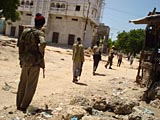Somalia: Al-Shabaab Defiant, Determined
By Abdurrahman Warsameh for ISN
A recent string of victories by Al-Shabaab militias in central Somalia and the capital Mogadishu has alarmed the international community, prompting the African Union (AU) and the UN Security Council to meet over the matter, but the insurgent group seems unmoved by condemnations and threats of sanctions over areas under their control.
Last week, insurgents took over two of the most important towns that had been in the hands of government supporters, Jawhar and Mahaday.
Fighters from Al-Shabaab and Hezbul Islam, an allied faction, have been mounting attacks against forces loyal to President Sheikh Sharif Sheikh Ahmed, a moderate Islamist elected in January by the expanded Somali parliament following successful UN-brokered peace talks between the Somali government and a faction led by Sheikh Ahmed.
Al-Shabaab now effectively controls almost the entire south and central portions of Somalia except for few pockets run by Hezbul Islam, which also partly controls the central Somali town of Beledweyn, the last stronghold of pro-government forces in central Somalia.
In the latest onslaught, fighters managed to take large swathes of key positions in Mogadishu from government forces backed by a small contingent of AU troops.
Government officials put a survival strategy in motion by mobilizing its forces and waging a counter-offensive on 22 May, capturing nearly half of the territory it had lost in the previous days. But the victory was short lived as the insurgents hit back, reclaiming the lost territory and positioning themselves close to government forces and AU peacekeepers.
In areas such as the Presidential Palace in the southern part of the capital, insurgent fighters are positioned just meters away from AU forces.
“The Somali government's latest attempt to restore its fortunes made many people, including military and security people, doubt if it would survive any further concerted onslaught as it did not have the backing might of African forces who are the only challenge for opposition forces,” Osman Farah, a retired Somali general, told ISN Security Watch.
Farah said that if AU forces, who now number around 4,500, did not get the necessary reinforcements - including a broader counter-insurgency mandate, more troops, and improved intelligence and logistics - he doubted they would be able to hold on to their small territory in Mogadishu.
The never-ending blame game
The UN Security Council (UNSC) last week authorized the extension of the mandate of the AU Mission in Somalia (AMISOM) while pledging better financial support for the troops and calling on other member states to contribute to the force. This action came on the heels of the AU asking the UNSC to follow its lead and impose no-fly zones and a sea blockade on areas controlled by insurgent forces in south-central Somalia in an effort to curb the supply of arms to the militant groups.
The African bloc also accused Eritrea of supplying the insurgents with weapons. Although the East African nation denies arming the fighters, Eritrea openly says it supports what it sees as the Somali population's "legitimate right to self-government."
"The international community seems lost in regional geo-political tug of war between Ethiopia and Eritrea instead of actually doing what it can to realize peace and stability for the Somali people who have been suffering for more than two decades,” Mohamed Fanah of the Centre for Peace and Democracy (CPD) told ISN Security Watch.
Fanah says that the blame game does not serve those most affected by the ongoing violence in Mogadishu, the local civilians or the Somali government, which he said has been on life support since the fight for control of the capital began in early May.
Al-Shabaab eyes remainder of country, region
Al-Shabaab officials have said that neither no-fly zones and blockades nor the mandate extension of AMISOM forces would deter them from gaining control over Somalia and the East African sub-region and imposing the strict version of Islamic law they advocate.
The group, listed by the US as terrorist organization, said it would continue to deploy tactics similar to those used by insurgents in Iraq and Afghanistan, including suicide bombings, a rare but increasing feature used by Somali Islamist insurgents.
On 28 May, a suicide car bomber struck a Somali security forces camp in Mogadishu killing eight people, including six police officers, and wounding several others. Al-Shabaab claimed responsibility, stating that despite government reports to the contrary, the attack had been carried out by “a Somali, born and bred in Medina district of Mogadishu.
“We are not fighting only to implement Islamic sharia law in Somalia but all over the Muslim world and the whole of the planet earth which belongs to Allah for whom we are His representatives,” Sheikh Hussein Ali Fidow, Al-Shabaab’s chief for political and regional affairs, said in a recent press conference in Mogadishu.
Many Somalis believe that Al-Shabaab is much closer to realizing its goal than ever before, as the government, despite its popular support, struggles to survive the determined onslaught on its last position and the international community, which prides itself on being the supporter of the legitimate government of Somalia, engages in perpetual debate.

